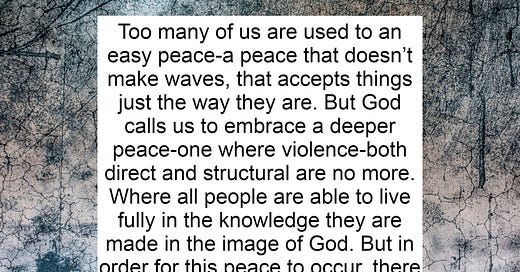Advent Week 2: Discord and Conflict as Paths to Peace
Luke 3:1-6
3:1 In the fifteenth year of the reign of Emperor Tiberius, when Pontius Pilate was governor of Judea, and Herod was ruler of Galilee, and his brother Philip ruler of the region of Ituraea and Trachonitis, and Lysanias ruler of Abilene,
3:2 during the high priesthood of Annas and Caiaphas, the word of God came to John son of Zechariah in the wilderness.
3:3 He went into all the region around the Jordan, proclaiming a baptism of repentance for the forgiveness of sins,
3:4 as it is written in the book of the words of the prophet Isaiah, "The voice of one crying out in the wilderness: 'Prepare the way of the Lord, make his paths straight.
3:5 Every valley shall be filled, and every mountain and hill shall be made low, and the crooked shall be made straight, and the rough ways made smooth;
3:6 and all flesh shall see the salvation of God.'
What do you think of when you hear the word peace? Do you think of a calm, quiet tranquil place where you are stress-free? Do you think of the absence of direct violence? Do you think of a home, community, or even nation without conflict or discord?
Sure, peace can encompass all that, but true peace is so much more. Peace is not just the absence of direct violence-especially if institutional forms of violence still exist. A society where there is no war or large-scale violence may not still be peaceful. Injustice is violence, even if it doesn’t immediately cause physical injury or death.
A society marred by structural violence can never be peaceful. The slogan, “no justice no peace” is often viewed as a threat. But it is also an apt description of reality. True peace can not occur in a world where black and brown people are murdered with impunity for simply existing, where the homeless and hungry are left to wither away and die, and where whole classes of people are viewed as “less than” human-based on immigration status or sexual/gender identity.
Additionally, the absence of conflict does not necessarily equal peace. In fact, conflict is not antithetical to peace-injustice is. Conflict is not necessarily in opposition to peace. How we navigate violence can lead to peace or away from it, but conflict itself is not necessarily something to be avoided. In fact, avoiding conflict and discord often perpetrates injustice.
I think about how often in the US, people decry the deep polarization among the two main political parties. And while that deep polarization has led to violence, especially when the violent extremists and terrorists of the far-right use their political beliefs to justify murder and insurgency, too often the solutions to this deep division are superficial. “I remember when politicians across the aisle could eat a shared meal together.” Or newspaper articles will focus on an individual or a group of people with radically opposing political beliefs sitting together and talking civility. They present that as the solution for the deep violence embedded in our society.
You know what’s missing from these feel-good stories? Discussion of oppression, injustice, violence. These feel-good stories ignore the ways in which American politics is tied to the subjugation and oppression of Black, Brown, and other people of color, disabled people, members of the LGBTQ+ community and other marginalized groups. When powerbrokers from the two main political parties-both of which are thrive on the exploitation and oppression of marginalized groups-wine and dine together they aren’t promoting peace-they are promoting the status quo which is built on structural inequality and violence.
It isn’t the heartwarming story the media or tik tok thinks it is when a white liberal and a white conservative are best friends and say they can set aside politics. Of course, they can; regardless of their political stance they benefit and endorse white supremacy. The white liberal may hide their commitment to white supremacy by saying the “right” words, but their actions often fall short of truly embracing LGBTQ+ rights or the idea that Black Lives Matter.
When you advocate for an end to oppression and the violent status quo, the response from those wedded to injustice will be anything but peaceful. In fact, the conflict that results from speaking out against oppression can be construed as oppositional to peace. Opponents will claim: “You are causing trouble! You are causing division!” They will claim YOU are disturbing the peace. But the reality is that they don’t want peace, they want docile acceptance of injustice.
John the Baptist was a disruptive force. His presence shattered the false peace offered by the Roman Empire. But while his presence (and later that of Jesus) disturbed the false peace of compliance-they offered a true peace based on the equality of all and an end to oppression.
Too many of us are used to an easy peace-a peace that doesn’t make waves, that accepts things just the way they are. But God calls us to embrace a deeper peace-one where violence-both direct and structural are no more. Where all people are able to live fully in the knowledge they are made in the image of God. But in order for this peace to occur, there must at first be discord and conflict.
Why? Because calling for a world without injustice, will never be acceptable to those who benefit from the oppressive status quo. And they will do whatever possible to hold onto power. So our attempts to bring about true peace, may in the short turn, create discord and conflict. But that’s ok. In fact, it is necessary. There can never be true peace without justice.



